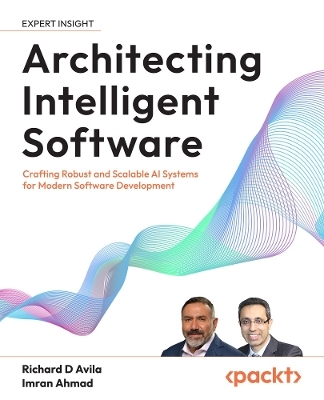
Architecting Intelligent Software
Packt Publishing Limited (Verlag)
978-1-80461-597-3 (ISBN)
Key Features
Learn to integrate AI with traditional software architectures, enabling architects to design scalable, high-performance systems
Explore key tools and processes to mitigate risks in AI-driven system development, ensuring timely project delivery and budget control
Gain hands-on experience through case studies and exercises, applying architectural concepts to real-world AI systems
Book DescriptionArchitecting Intelligent Software provides a definitive guide to building AI-enabled systems, emphasizing the balance between AI’s capabilities and traditional software architecture principles.
As AI technologies gain widespread acceptance and are increasingly expected in future applications, this book provides architects and developers with the essential knowledge to stay competitive. It introduces a structured approach to mastering the complexities of AI integration, covering key architectural concepts and processes critical to building scalable and robust AI systems while minimizing development and maintenance risks. The book guides readers on a progressive journey, using real-world examples and hands-on exercises to deepen comprehension. It also includes the architecture of a fictional AI-enabled system as a learning tool. You will engage with exercises designed to reinforce your understanding and apply practical insights, leading to the development of key architectural products that support AI systems. This is an essential resource for architects seeking to mitigate risks and master the complexities of AI-enabled system development.
By the end of the book, readers will be equipped with patterns, strategies and concepts necessary to architect AI-enabled systems across various domains.What you will learn
Understand the challenges of building AI-enabled systems and managing risks like underperformance and cost overruns
Learn architectural tools to design and integrate AI into traditional systems
Master AI/ML concepts like inference and decision-making and their impact on architecture
Use architectural models to ensure system cohesion and functionality
Simulate and optimize AI performance through prototyping and iteration
Design scalable AI systems using patterns and heuristics
Integrate AI into large systems with a focus on user experience and performance
Who this book is forThis book is designed mainly for software and systems architects responsible for designing and integrating AI capabilities into existing and new systems. It also serves as a valuable resource for CTOs, VPs of Engineering, and aspiring architects seeking a comprehensive understanding of the holistic approach to AI system development. Additionally, AI/ML engineers and software developers will benefit from gaining deeper insights into the architectural principles that underpin AI systems, enabling them to align their work with broader architectural goals
Mr. Avila is a software and systems architect with over two decades of industry experience building complex software systems. He has architected and held leadership roles for building a wide array of software systems from complex simulations, autonomy and data analytic systems. He is also a principal investigator for AI topics. He has published in referred journals and industry publications on command-and-control theory, assurance architectures, multi-agent modeling, and machine learning. He was the first expert instructor on data analytics at University of Maryland Baltimore County – Training Centers. Before working as a software and systems architect, he served in the US Navy as a submarine officer. He resides in Annapolis, Maryland USA. Imran Ahmad is the author of the “50 Algorithms every programmer should know”. He has been a part of cutting-edge research about algorithms and machine learning for many years. He completed his PhD in 2010, in which he proposed a new linear programming-based algorithm that can be used to optimally assign resources in a large-scale cloud computing environment. In 2017, Imran developed a real-time analytics framework named StreamSensing. He has since authored multiple research papers that use StreamSensing to process multimedia data for various machine learning algorithms. Imran is currently working at Advanced Analytics Solution Center (A2SC) at the Canadian Federal Government as a data scientist. He is using machine learning algorithms for critical use cases. Imran is a visiting professor at Carleton University, Ottawa. He has also been teaching for Google and Learning Tree for the last few years.
Table of Contents
Challenges of building AI enabled systems
The case for architecture
Software engineering and architecture
Key Concepts for intelligent functionality
Survey of techniques
Data engineering
Computation
Conceptual Design
Requirements & Architecture
Simulation Development, prototyping and analysis
Detailed Design & Implementation
Integration and Test
Don't Delay, Start Experimenting
| Erscheinungsdatum | 28.09.2024 |
|---|---|
| Verlagsort | Birmingham |
| Sprache | englisch |
| Maße | 191 x 235 mm |
| Themenwelt | Mathematik / Informatik ► Informatik ► Netzwerke |
| Informatik ► Theorie / Studium ► Künstliche Intelligenz / Robotik | |
| ISBN-10 | 1-80461-597-8 / 1804615978 |
| ISBN-13 | 978-1-80461-597-3 / 9781804615973 |
| Zustand | Neuware |
| Haben Sie eine Frage zum Produkt? |
aus dem Bereich


